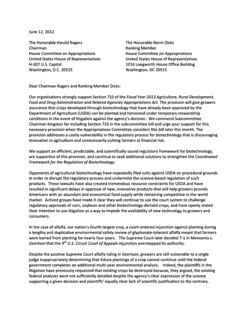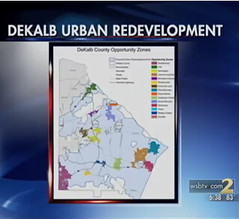Jack Kingston (GA-01) slipped the Monsanto rider into a recent law,
requiring “the Secretary of Agriculture to grant a temporary permit for
the planting or cultivation of a genetically engineered crop, even if a
federal court has ordered the planting be halted until an Environmental
Impact Statement is completed”.
Alexis Baden-Mayer wrote for AlterNet 8 July 2012,
The “Monsanto Rider”: Are Biotech Companies About to Gain Immunity From Federal Law?
 Whom do we have to thank for this sneak attack on USDA safeguards?
The agricultural sub-committee chair Jack Kingston (R-Ga.) —
who not coincidentally was voted “legislator of the year for
2011-2012” by none other than the Biotechnology Industry
Organization, whose members include Monsanto and DuPont.
As reported by Mother Jones,
the Biotechnology Industry Organization
declared Kingston a “champion of America’s biotechnology industry”
who has
“helped to protect funding for programs essential to the survival of
biotechnology companies across the United States.”
Whom do we have to thank for this sneak attack on USDA safeguards?
The agricultural sub-committee chair Jack Kingston (R-Ga.) —
who not coincidentally was voted “legislator of the year for
2011-2012” by none other than the Biotechnology Industry
Organization, whose members include Monsanto and DuPont.
As reported by Mother Jones,
the Biotechnology Industry Organization
declared Kingston a “champion of America’s biotechnology industry”
who has
“helped to protect funding for programs essential to the survival of
biotechnology companies across the United States.”
The Biotechnology Industry Organization’s
PR about that award of 24 April 2012 says down at the bottom:
Photos of the award presentation are available upon request.
 If that award is such an honor,
why are they hiding the pictures of Jack Kingston receiving it?
If Monsanto’s products are so great, why don’t they label them
so we can tell which they are?
Why did a French court
just uphold a conviction of Monsanto
for poisoning a French farmer?
Why does Monsanto
oppose independent GMO research?
And why did
hundreds of thousands of people just march against Monsanto?
If that award is such an honor,
why are they hiding the pictures of Jack Kingston receiving it?
If Monsanto’s products are so great, why don’t they label them
so we can tell which they are?
Why did a French court
just uphold a conviction of Monsanto
for poisoning a French farmer?
Why does Monsanto
oppose independent GMO research?
And why did
hundreds of thousands of people just march against Monsanto?
 Could it be because of
liver and kidney damage, cancer and birth defects, pollution of water and air,
systematic gaming of the patent system,
perversion of the regulatory system,
and corruption of the legislative system?
Could it be because of
liver and kidney damage, cancer and birth defects, pollution of water and air,
systematic gaming of the patent system,
perversion of the regulatory system,
and corruption of the legislative system?
Speaking of corruption,
Kingston has put the survival of biotechnology companies above
the survival of farmers and the health of the American people.

Jack Kingston, voted Biotech “Legislator of the Year.” Responsible for adding the Monsanto Immunity Rider to the farm bill (H.R. 5973, Section 733). Tell him what you think!
www.facebook.coim/jackkingston/, 202-225-5821, 912-352-0101
-jsq
 The NRC “upheld” license denial for the Calvert Cliffs nuke
with its fingers crossed, the very same day
directing staff to look into changing the requirement
by which it just ruled.
A requirement against majority ownership by a foreign firm,
in this case
Électricité de France (EDF),
whose flagship Cattenom reactor
caught on fire a week ago with smoke seen from miles away;
two people died at Cattenom in February.
You can comment on NRC’s proposed changes to let EDF
fire up Calvert Cliffs
online or in person June 19th in Maryland.
The NRC “upheld” license denial for the Calvert Cliffs nuke
with its fingers crossed, the very same day
directing staff to look into changing the requirement
by which it just ruled.
A requirement against majority ownership by a foreign firm,
in this case
Électricité de France (EDF),
whose flagship Cattenom reactor
caught on fire a week ago with smoke seen from miles away;
two people died at Cattenom in February.
You can comment on NRC’s proposed changes to let EDF
fire up Calvert Cliffs
online or in person June 19th in Maryland.
 The same day
the NRC upheld denial of a license, 11 March 2013,
the same Commission
The same day
the NRC upheld denial of a license, 11 March 2013,
the same Commission



 Again, we commend Subcommittee Chairman Kingston’s efforts and
urge the support of Section 733 in the Fiscal Year 2013 Agriculture,
Rural Development, Food and Drug Administration and Related Agencies
Appropriations Act.
Again, we commend Subcommittee Chairman Kingston’s efforts and
urge the support of Section 733 in the Fiscal Year 2013 Agriculture,
Rural Development, Food and Drug Administration and Related Agencies
Appropriations Act.














